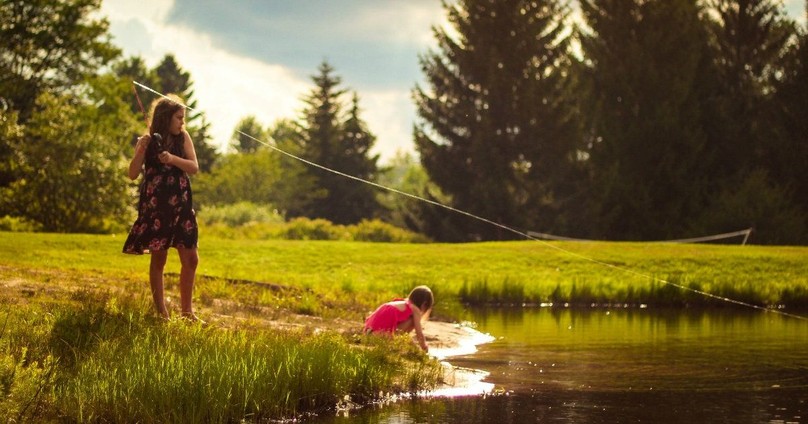
Remember when summer days used to be described as “lazy”? Anytime I hear the term “lazy summer days” I think of big, southern porches, hammocks, and tall glasses of lemonade. It’s a scene right out of Steel Magnolias.
Even though there were no porches, hammocks, or lemonade, my summers growing up would be considered lazy. Maybe a little too lazy. I remember a few camps here and there, but for the most part I spent my summers at home sleeping late and watching too much television. That was before Netflix and parents weren’t as sensitive as they are today about the amount of television their children watched. Or even what they watched for that matter. At least mine weren’t.
Although there was a lot wrong with endless amounts of unstructured time, it wasn’t all bad. For one I had the opportunity to get bored and miss school. And there was definitely rest.
This past year my daughter attended preschool for the first time. As it got closer to the end of the year a flyer came home about summer camps the preschool is offering. There are different themed sessions, and the children can attend as many sessions as you choose. Basically it’s preschool during the summer.
When I first read the flyer I thought back to the phrase “lazy summer days” and wondered where those days had gone. Preschool in the summer? What ever happened to just summer for summer’s sake? No structure or objectives or learning?
Summer camps at our preschool aren’t the only summer activities available in our community. There are dollar movies, library programs, swim lessons, and camps for any interest your child might have. Like Legos? There’s a Lego camp. Is chess your thing? There’s a camp for that too. Horseback riding? Yes, they have it. The list goes on.
I wanted to preserve some laziness this summer, but all of this sounded very intriguing . . . and fun. I didn’t want summer to be a continuation of the busyness of the school year, but I didn’t want my daughter to miss out on opportunities to participate in activities she normally wouldn’t.
Throughout the year parents struggle with balancing extracurricular activities, and summer is no different. There’s the extreme of being gone every night of the week, which wears both children and parents out, and then there’s the other extreme of children having too much unstructured time. It’s a fine line between keeping kids busy enough so that they are productive and not so busy that they burnout, never see their family, or don’t learn to entertain themselves.
As I thought about our summer experience I didn’t want either extreme. I didn’t want every moment to be filled, but at the same time I wanted to take advantage of the activities available. I wanted to be intentional in creating a healthy balance between rest and activity.
Here are four criteria I used to plan a summer of rest and activity:
1. Does this activity contribute something new to my child’s life that she hasn’t already experienced?
Summer activities are great ways for children to explore a new sport, hobby, or skill without committing to it for an entire school year. For example, maybe your child thinks he wants to play baseball but isn’t sure if he’d like it. Being on a baseball team is a big investment of time and money. However, a baseball summer camp for a few weeks would give him exposure to the sport to see if he wants to pursue it further.
2. Is the activity a sport, hobby, or skill that will benefit my child past just this summer and possibly even into adulthood?
It’s always fun to do something just for the fun of it with no agenda of learning something. But sometimes it’s good to think about what your child will get out of an activity past the initial classes or practices, especially when you’re mindful of not being busy for busy sake. For instance, it is important for me that my three-year-old learns to swim well. This is a skill she needs to learn for safety in the water and to enjoy water activities and sports. I signed her up for swimming lessons because I felt like the time and money we invest in them will benefit her for years to come.
3. Will participating in this activity cause an extreme sacrifice of time or money for other people in your family?
It’s so tempting to get caught up in giving your child all the experiences you can give them, but summer activities are never a good idea if they’re not in the budget. They’re also not a good idea if they mean other children or family members will have to sacrifice for the expense of one. For example, my seven-month-old still takes two naps a day. My three-year-old will participate in some summer activities, but I’m mindful of not over scheduling her at the expense of the baby’s needs.
4. What are your motives for your child participating in this activity?
While planning our summer I remembered a conversation I had with my daughter one day. She had just started preschool, and I asked her if she liked it. She told me she did like it, and then she said this: “But I still want to be with you, Mommy.”
At the end of the day, nothing can replace the time your children have with you. Above all the camps, lessons, and fun, children value time with their parents most of all. As we look at the summer months ahead, sometimes all we see is an endless two months of constant care and entertaining. Summer brings parents some anxiety as they wonder if they’ll be able to survive it. The temptation might be to put your child in camp after camp and activity after activity to relieve that tension. But remember it’s in the rest that the memories are made.
When our children look back on their childhoods, their greatest memories will not be that they went to over-night camp, learned to hit a golf ball far, or finally dove off the diving board. Their greatest memories will be the rest times - the conversations around the grill, time running through the sprinkler, and nights curled up with a bowl of popcorn. Their greatest memories will be the time they spent with you.
Regardless of your family’s needs, let’s be intentional this summer about wisely choosing activities and purposely scheduling rest times at home. Then are children will look back at those lazy days of summer with fondness.



